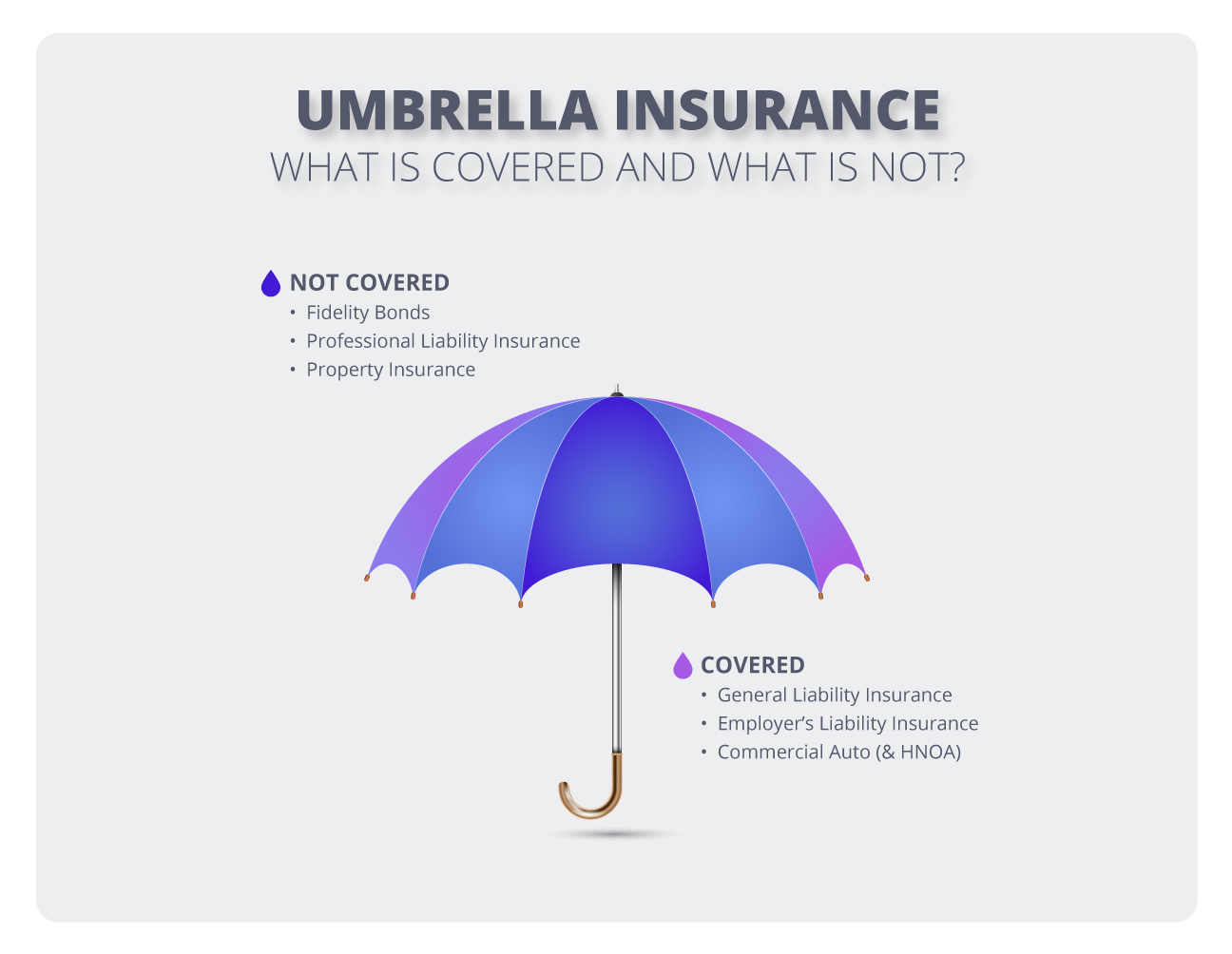
Commercial umbrella insurance
Commercial umbrella insurance
Once a policy’s limit is reached, commercial umbrella insurance provides additional coverage for liability claims made on general liability, commercial auto, or employer’s liability insurance.
Why is commercial umbrella insurance important for small businesses?
Business owners who purchase commercial umbrella insurance usually need it to fulfill a contract that requests higher than standard policy limits offered by an insurance company.
Umbrella insurance provides additional liability coverage for the most expensive lawsuits. For example, if a major accident maxes out your general liability policy but you still owe money for damages, business umbrella insurance can supply funds to make up the difference.
An umbrella insurance policy can supplement coverage provided by:
- General liability insurance
- Employer's liability insurance (often included in workers' compensation insurance)
- Commercial auto insurance or hired and non-owned auto (HNOA) insurance
Commercial umbrella insurance can boost coverage for any (or all) of these policies in $1 million increments. Before you can purchase umbrella insurance, however, an insurer will require you to carry a certain amount of coverage for the underlying policy.

Businesses that buy umbrella insurance coverage:
- Have insurance but need to close the gap on requirements above $2 million
- Have high liability risks, such as a business location with a lot of foot traffic
- Need more liability protection across several policies
What does commercial umbrella insurance cover?
Commercial umbrella insurance policies often have the same terms and cover the same risks as the underlying business insurance policy.
Specifically, umbrella insurance can help provide additional coverage for the following:
Slip-and-fall injuries
When you add commercial umbrella insurance to your general liability insurance, it can cover your legal expenses if someone falls and gets injured on your business property.
Third-party property damage
When you add commercial umbrella insurance to a general liability policy, it helps pay for legal bills related to stolen, damaged, or destroyed property that belongs to someone else.
Car accidents
Adding umbrella insurance to a commercial auto insurance or hired and non-owned auto insurance policy helps cover costs if someone sues for damages caused by your vehicle.
Businesses that own a company vehicle are required to carry commercial auto insurance in most states, including New York, Texas, Illinois, and California.
Employee injury lawsuits
When you add commercial umbrella insurance to employer's liability insurance, it helps pay for employee lawsuits related to work injuries.

How much does commercial umbrella insurance cost?

For Insureon customers, commercial umbrella insurance costs an average of $75 per month.
Several factors affect business umbrella insurance costs, including:
- Industry and risks
- Location and size of your business
- Number of employees
- Number of vehicles
- Your coverage needs
- Claims history
- Policy exclusions and endorsements
Verified business insurance reviews
Hear from customers like you who purchased small business insurance.
How does commercial umbrella insurance work?
Think of commercial umbrella insurance coverage as a safety net. Your other liability policies are your first line of defense.
When you need an extra layer of protection on a claim that exceeds the limits of your primary policy, your business umbrella insurance can pick up the slack.
A big claim, such as an accident that injures multiple people, could easily max out your policy and leave you paying costs out of pocket. An umbrella policy is an affordable insurance solution that can give you the peace of mind and security you need.
Here's when you need it
Let's say you have a commercial general liability policy with a $2 million per-occurrence limit, which means it can pay up to $2 million for claims from a single incident.
If a client suffers a permanent injury after tripping on a broken step at your office, the medical bills, legal fees, and damages could add up to $2.5 million. After hitting your general liability limit, you would still have a $500,000 bill.
Here's how it helps you
An umbrella liability policy can help cover the expenses that exceed your underlying policy's limit. For the case above, a business umbrella policy would cover the additional $500,000.
Basically, you can make a claim on umbrella insurance when the following occurs:
- Your business is sued over a bodily injury or property damage.
- The cost of the lawsuit exceeds the limit of your underlying policy.
Who needs a commercial umbrella policy?
Commercial umbrella insurance used to be a policy that only big businesses bought. These days, small business owners often invest in umbrella insurance due to the rising cost of lawsuits and medical expenses.
You should consider an umbrella liability policy if:
You want to sign a big client who requires more liability insurance
Umbrella coverage helps close the gap on contract requirements for higher limits, typically more than $2 million.
For example, if a general contractor is bidding on a project and the contract requires a general liability policy with a $5 million per-occurrence limit, an umbrella policy of $3 million could be added to the contractor's existing $2 million general liability policy.
You have lots of contact with the public
The more foot traffic a business has, the greater its liability risks.
For example, if a customer trips on uneven flooring at your restaurant and sustains serious injuries that leave them with a chronic health problem, they could decide to sue for $3 million in damages to recoup the cost of medical expenses.
If your restaurant's general liability policy has a per-occurrence limit of $2 million, umbrella insurance would cover damages beyond the initial $2 million, up to the umbrella policy's limits.
Your business owns vehicles
A business with a fleet of vehicles might want umbrella coverage to protect against the cumulative costs of minor vehicle accidents or a large multi-vehicle accident.
For example, if a window installer driving a company van to a jobsite accidentally causes a pile-up, the other drivers could decide to sue for damages.
An umbrella policy would cover the window installation business's legal defense costs once the auto policy is maxed out. It would also cover damages paid to other drivers in the form of a settlement or court-ordered judgment.
Your work is hazardous
The more hazardous the work, the greater the risk of employee injury—especially in industries such as construction or installation.
For example, a long-time employee at an HVAC installation company might sue their employer over a chronic back injury caused by repeatedly lifting heavy equipment without assistance.
An umbrella liability policy added to employer's liability insurance guards against these types of employee claims, and can cover the cost of hiring a lawyer or any resulting settlement after the underlying policy's limits are reached.
What does commercial umbrella insurance not cover?
While umbrella insurance expands coverage limits for a number of policies, it does not provide all the protection that a small business might need.
For instance, an umbrella policy generally won't cover the following exclusions:
Damages within the underlying policy limits
Umbrella liability insurance does not become active until the underlying policy has reached its limits. And as with any policy, it does not provide coverage beyond its own policy limits.
Business property damage
Business umbrella insurance can only be added to liability policies, not property insurance.
The commercial property insurance portion of a business owner's policy (BOP) or commercial package policy (CPP) can help pay for repairs or replacement when your business property is stolen or damaged by a fire or storm.
Professional errors
Professional liability insurance can cover lawsuits related to mistakes, undelivered services, missed deadlines, and other instances of professional negligence. It's also called errors and omissions (E&O) insurance or malpractice insurance, depending on the industry.
You can boost the limits on this policy with excess E&O, a type of excess liability insurance that's similar to umbrella insurance.
Employee theft
Commercial crime insurance, including a fidelity bond, can financially protect your business if an employee commits a criminal act against your business or a client.
Unlike insurance, the amount paid out by a bond must be repaid to the company that issued it. Umbrella insurance could not be used to provide coverage beyond the bond amount.
General liability insurance
Business owner’s policy
Workers’ compensation insurance
Commercial auto insurance
Cyber insurance

Save money on all of your small business insurance coverages
Get covered cost effectively and give back to business with Insureon. Insurance isn't as expensive as you might think.
The right policies can handle lawsuits or workers comp claims saving you thousands of dollars. From general to cyber liability, your costs are based on your type of business, number of employees and location.
Insureon helps you compare policies with the best rates from A plus carriers and our expert brokers will get you covered the same day.
Start your application now, it's easy. Protection is peace of mind.
Before getting commercial umbrella insurance, it's important to find the underlying coverage that meets your small business's needs.
Complete our easy online application to get free business insurance quotes today.
FAQs about commercial umbrella insurance
Get answers to frequently asked questions about commercial umbrella coverage.
How much commercial umbrella insurance do you need?
Businesses usually purchase an umbrella policy to fulfill contracts calling for limits of more than $2 million. Contracts of up to $5 million are not uncommon. In that case, an umbrella policy with a limit of $3 million would be added to a policy with a $2 million limit to meet the requirement.
Otherwise, the amount depends on your industry and your business needs. For example, you may want to secure more coverage for a team of construction workers, a commercial fleet of vehicles, or products that could potentially harm customers.
As you compare umbrella insurance quotes and consider your options, keep these three things in mind:
- You can't buy umbrella insurance without having at least one other policy. You need to have general liability, employer’s liability, or commercial auto liability insurance before you can get umbrella coverage.
- Umbrella insurance doesn't work with commercial property insurance. While it can boost several other policies, umbrella insurance won't help with business property damage.
- Umbrella insurance comes in $1 million increments. Small business owners can increase their liability protection in $1 million increments, which means you can buy the exact amount you need.
If you're unsure how much coverage you need, chat with a licensed insurance agent.
What is the difference between commercial umbrella insurance and excess liability insurance?
You may see the terms commercial umbrella insurance and excess liability insurance used interchangeably, but they’re not the same.
- Excess liability insurance provides additional coverage for just one of your business insurance policies, usually general liability insurance or E&O insurance.
- Commercial umbrella insurance can boost the coverage of several different policies in the event of a claim that exceeds your policy limits.
Where can I learn more about commercial umbrella insurance?
If you want to learn more about this policy, you can review our frequently asked questions about commercial umbrella insurance.
For any other questions about coverage, you can contact an Insureon agent.


























